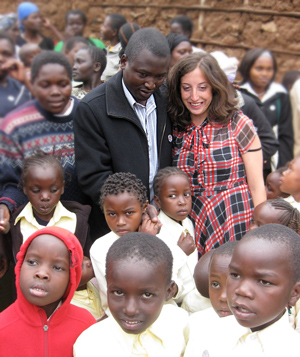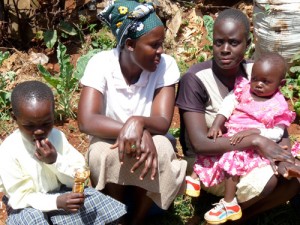Students to Create Health Care Clinic in Kenya Slum
A student-created health care clinic in Kibera, Kenya, named for Johanna Justin-Jinich, receives grant from Newman’s Own Foundation
Last year, two students from Wesleyan founded the first tuition-free school for girls in Kibera, Africa’s largest slum, located in Nairobi, Kenya. This year, they’ve teamed with three more Wesleyan students and medical experts to create a health care clinic on the same site.

The Johanna Justin-Jinich Memorial Clinic of Kibera will be the first community-driven clinic in Kibera that specializes in women’s health. The student-created Shining Hope for Communities non-profit organization will preside over the clinic’s construction and daily operation.
Johanna Justin-Jinich was shot and killed off campus during her junior year at Wesleyan in May, 2009.
More than $37,000 in construction seed-funds has been provided to Shining Hope for as part of a $53,000 grant from Newman’s Own Foundation in support of The Johanna Justin-Jinich Memorial Clinic of Kibera. Additional funds from the grant will also fund an on site Green Bio-Latrine Center.
“When I first heard Kennedy Odede and Jess Posner speak about Shining Hope’s work in Kibera, I immediately knew this was the type of program we should look at, and Kennedy and Jess were the type of committed young people we want to encourage,” said Bob Forrester, president of Newman’s Own Foundation. “We are proud to support Shining Hope.”
Shining Hope for Communities also operates the Kibera School for Girls and the Shining Hope Community Center. The Kibera School for Girls was also the recipient of a 100 Project for Peace grant in 2009.
Designed to initially serve 5,000-6,000 Kibera residents annually, the Johanna Justin-Jinich Memorial Clinic will be a community-driven initiative staffed by a Kenyan nurse five days a week in tandem with community health workers and a full-time administrator. A physician will also maintain hours at the clinic one day a week. The clinic is scheduled for construction this summer.
Shining Hope for Communities’ senior administration consists of Executive Director and Kibera native Kennedy Odede ’12; Managing Director Jessica Posner ’09 and Wesleyan students Leah Lucid ’10, Ari Tolman ’10, and Inslee Coddington ’10.
The land and medical permits for the clinic are in hand and the students are now working to secure funding for the future sustainability of the project.
One of the primary health care concerns the students hope the clinic will affect immediately is the issue of reproductive health.

“The number one killer of women in Kibera is childbirth, and extreme gender discrimination creates strong barriers for women accessing health facilities or health information,” says Posner. “As a result, young women in Kibera contract HIV at a rate five times greater than men in the region. Kibera already has one of the highest incidences of HIV in the world. We’re hoping to offer an additional point of care for these women as well as an alternative to more costly care options.”
United Nations estimates indicate as many as 1.5 million people live in Kibera, including approximately 500,000 women of childbearing age. The Kenyan government does not formally acknowledge the slum’s existence, contending that Kibera’s residents are illegally squatting on government-owned land. As a result, the Kenyan government refuses to provide basic services or infrastructure, such as toilets, roads, hospitals, or schools to the residents.
The slum’s deplorable sanitary conditions and lack of access to health care contribute greatly to 20 percent of children in the slum dying before their fifth birthday. The overall average life expectancy in Kibera is 30, compared with 50 years of age in the rest of Kenya.

Along with the health care challenges involved with pregnancies, including infant mortality, low birth weight babies, and maternal death in or just after childbirth, the greatest health threats in Kibera are pneumonia, diarrheal diseases, tuberculosis, and HIV/AIDS. The use of basic health care, health care education and preventative methods can greatly reduce the effect and impact of these threats.
The clinic is the most recent development in an investment in the Kibera slums by Wesleyan students. In August 2009, Jessica Posner and Kennedy Odede founded The Kibera School for Girls, the first free school for girls in Kibera. The school provides classes for girls in pre-K through second grade, and will expand over the next few years to ultimately include instruction up to the eighth grade.
The non-profit also runs the Shining Hope Community Center, adjacent to the school. The community center provides essential social services that are otherwise unavailable. This includes providing education on how to build vertical gardens and offering adult literacy and computer skills classes. The community center also has a library, and houses the Green Bio-Latrine Center, which provides the only sanitary latrines in the area.
The clinic is named for Johanna Justin-Jinich who was scheduled to graduate in May, 2010 and had planned to dedicate her life to helping people in need. She had hoped to go on to graduate school in international public health, focusing primarily on women’s access to healthcare and reproductive rights. Those who knew Johanna repeatedly speak of her astonishing intellect, creativity and generosity of spirit.
“Opening the doors of a clinic to people in need in Kibera will be a profound way for us to feel like we are keeping Johanna alive, and a way for me to feel like Johanna is with me in Kenya,” says Lucid.
“To see a health clinic in Kibera which devotes itself to healing the bodies and souls of women and girls, so that they, in turn, can more fully care for their own families and contribute to their own communities,” said Ingrid Justin, MD, Johanna’s mother. “What a wonderful expression of Johanna’s aspirations. How I look forward to working there.”
For more information about Shining Hope for Communities, visit www.hopetoshine.org.
About Newman’s Own Foundation: Paul Newman was committed to helping make the world a better place. To carry on his philanthropic legacy, Newman’s Own Foundation donates all net royalties and profits after taxes from the sale of Newman’s Own products to charity. To date, Paul Newman and Newman’s Own Foundation have given over $290 million to thousands of charities around the world. For more information, visit www.newmansownfoundation.org.

